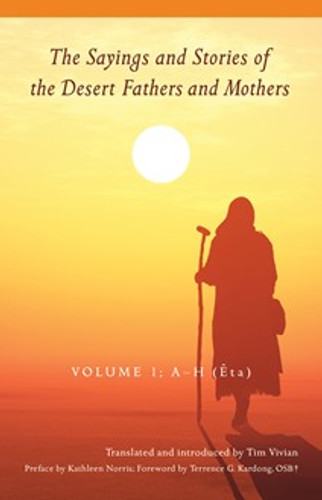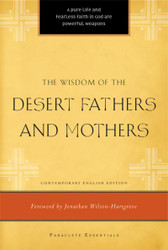2022 Catholic Media Association second place award in theology: history of theology, church fathers and mothers
The Sayings and Stories of the Desert Fathers and Mothers offers a new translation of the Greek alphabetical Apophthegmata Patrum, The Sayings of the Desert Fathers. For the first time in an English translation, this volume provides:
- extensive background and contextual notes
- significant variant readings in the alphabetical manuscripts and textual differences vis-à-vis the systematic and anonymous Apophthegmata
- reference notes to both quotations from Scriptures and the many allusions to Scripture in the sayings and stories.
In addition, there is an extensive glossary that offers information and further resources on people, places, and significant monastic vocabulary. Perfect for students and enthusiasts of the desert tradition.
Product Preview
| Format: | Paperback book |
|---|---|
| Product code: | LPCS287P |
| Dimensions: | 5½" x 8½" |
| Length: | 416 pages |
| Publisher: |
Liturgical Press
|
| ISBN: | 9780879071097 |
| 1-2 copies | $43.95 each |
|---|---|
| 3-9 copies | $41.95 each |
| 10-49 copies | $39.96 each |
| 50-99 copies | $38.96 each |
| 100+ copies | $37.46 each |
Praise
A wonderful book. The introduction on its own ought to be required reading in all theological schools and for those interested in literature generally. This collection of The Sayings and Stories of the Desert Fathers and Mothers (Vol. 1) is an edition that is destined to become a classic standard. To situate his material, Tim Vivian offers a generous and reflective introduction to the desert tradition that is both scintillating in its intellectual brilliance and moving in its spiritual profundity. The scholarly translations are accompanied at every step by commentary and insight that demonstrate Vivian’s fluent mastery and his status as one of the world’s preeminent leaders in the field. It is a book that scholar and student alike will treasure.
The flow and precision of Tim Vivian’s translation allows for the personalities, messages, and worldview of the Sayings to resonate poignantly today. Moreover, his masterful notes reveal the complex linguistic and spiritual layers of these texts, as well as the degree to which scriptural language and imagery permeated monastic thought. Whether read for academic or spiritual purposes, one will encounter fresh insights and the distilled results of decades of research and reflection on every page of this remarkable volume.
To understand the parabolic and paradigmatic nature of the apophthegmata (wise sayings) of the desert ammas and abbas, it is best to have a guide as gifted in the ancient languages of the sayings as Vivian, but also to enter into these stories with the contemplative framework of lectio divina, as Vivian recommends in his introduction. In the process, the hidden depths of these elders open up layers in one’s own search for the Holy One and the blessings and pitfalls of the spiritual life.
A consummate scholar, deft translator, and skilled wordsmith, Tim Vivian links ancient insights to contemporary spirituality and the work for justice. In this collection of sayings and stories, he offers a wealth of detail to feed the mind of any scholar and an abundance of wisdom to fill the soul of every seeker.
Professor Tim Vivian has dedicated much of his academic career to bringing out the jewels of Coptic Monasticism that provided the inspirational and functional foundation for monasticism worldwide. His latest work brings the writings of the Mothers and Fathers in a model that serves both the benefit of their teachings as well as collectively the personality of those that said them. Bringing this systematic grouping from its original Greek to the English-speaking world is not only a blessing but a guide for those that seek holiness in their lives whether in the world or in seclusion away from it. The additional distinctive reflections of the author add that much value for the work. We pray that the complete collection will soon be in the hands of so many of us that waited for it for untold years.
Bringing a depth of experience as a translator of early monastic texts, Tim Vivian offers not only a new, vivid translation of the Apopthegmata Patrum, but also a rare window into the process, and challenge, of translation itself. With an introduction that not only orients the reader to this complex literature but also draws our attention to its contemporary spiritual significance, and a set of tools to decode the language of the desert fathers and mothers, this two-volume work offers rich resources for lovers of the desert monastic tradition and for those encountering for the first time.
The desert fathers and mothers are still popular today, fifteen or sixteen centuries after their deeds and words were recorded. People are inspired by these pithy sayings, and perhaps at times amused by them. But in either case, the context in which they lived and worked and prayed is vague and general, usually limited to a brief introduction to the sayings themselves. Tim Vivian’s book supplies this context and more. His introductions to each of the monks and nuns give what historical information is available, and he allows us to appreciate their individuality. He takes the time for personal reflection on the sayings of each one as a whole, rather than as separate quotes, and relates these ancient sayings to our world, brings them into our time, with wise lessons to teach us. In his notes, he gives more background, scriptural echoes and sources, and his exploration of the Greek behind the translation illuminates aspects of the sayings which would otherwise be lost in translation. This is a book which general readers will thoroughly enjoy, and scholars will appreciate. I look forward to the next volume in this series.
We should be grateful for this beautiful new translation of real treasures of the spiritual life that still speak to, yes convict, us.
When the publication of this translation is complete it will certainly be the most comprehensive and thorough resource for encountering and appreciating this fundamental compendium of early monastic teaching.
Those who love the desert mothers and fathers will greet this new translation of the alphabetical Apophthegmata or sayings with joy and gratitude. We should be grateful for this beautiful new translation of real treasures of the spiritual life that still speak to, and yes, convict us.
What Vivian does here is invite the reader to take up and read the sayings. He also shows the ongoing relevance of monastic desert spirituality by pairing the teachings of the apophthegmata nicely with the contemporary spiritual teachings of Gregory Boyle (of Homeboy Industries) and the always-relevant Thomas Merton. It is clear that Vivian has not only translated the sayings but internalized their spiritual message, and he is eager to see the same transformation occur in his readers.
This volume explores a little known source of Christian spirituality. It offers an excellent excavation of the desert mystics and those regarded as early Christian parents of monastic type spirituality.
The Introduction is a masterpiece. Church historians will appreciate the new translation, which gives an authentic flavor to the sayings and stories that are fundamentally part of the oral tradition.
Author
Tim Vivian is professor emeritus of religious studies at California State University Bakersfield and a retired priest in the Episcopal Church. In 2018, he received an honorary doctorate of divinity from the Church Divinity School of the Pacific (CDSP, Episcopal) for his scholarship and work for social justice. He has published numerous books, articles, and book reviews on early Christian monasticism, including, with Cistercian Publications, The Life of Antony, Words to Live By, The Holy Workshop of Virtue, and Becoming Fire.








